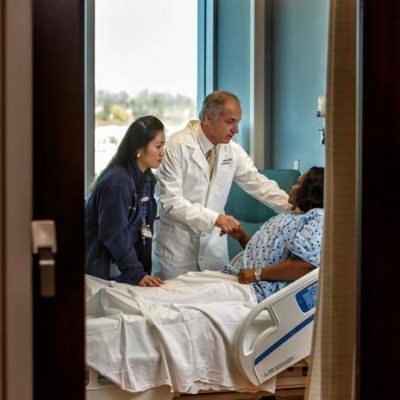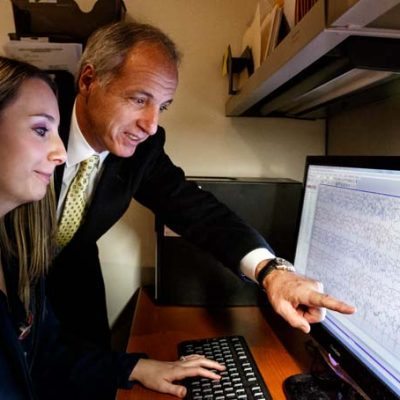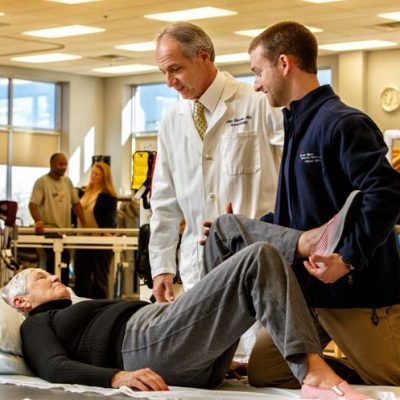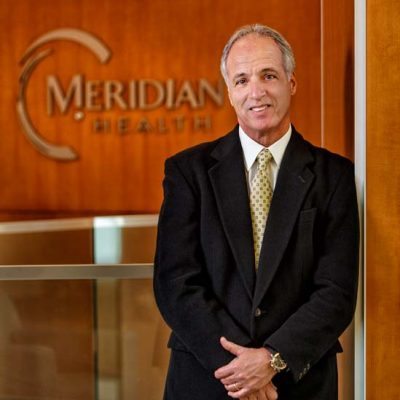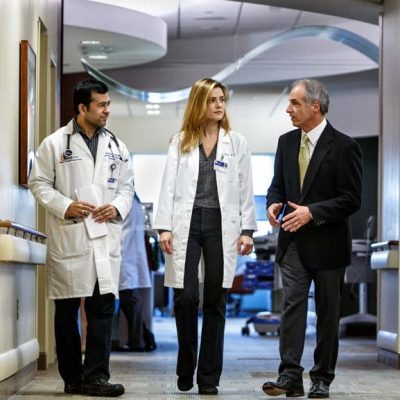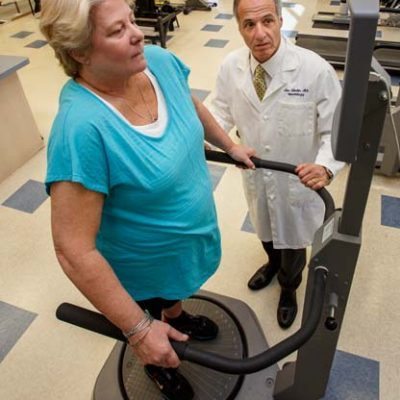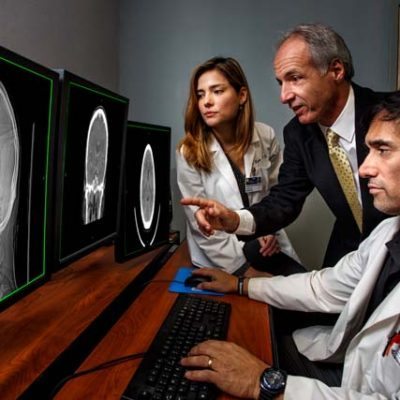
How Meridian Neuroscience has become a virtual institute for the treatment of neurological disease—helping patients to heal and return to normalcy
by Jessica Jones-Gorman • Photos By Amessé Photography
Over the past decade, Meridian Health has developed programs in neuroscience to diagnose and treat a range of conditions, from stroke and epilepsy to brain tumors, spine injuries, and movement and memory disorders. Staffed by a dedicated team of physicians and nurses skilled in diagnosing and treating diseases and injuries which threaten these critical nerve centers of the body, Meridian Neuroscience serves six hospital campuses and has become a mecca for the treatment of neurological disease, with a daily goal of reshaping lives.
“The geography of Meridian Health— especially in terms of neurosciences— simply makes sense,” noted neurologist Dr. Alan Colicchio, corporate medical director of Neuroscience for the hospital group. “We serve patients from northern Monmouth County to southern Ocean County, and function as a virtual neuroscience institute, utilizing the strengths and resources of all of our campuses. It’s a sort of hub-and-spoke model which allows us to deliver the highest quality care to patients throughout the state, bringing a team of talented neuroscience physicians together, clinically integrating in a multi-disciplinary fashion throughout the entire continuum of care.”
And Meridian Neuroscience, which encompasses a broad depth of programs including innovative, high-tech treatments, research, and a full continuum of care—from treatment through rehab—has become widely recognized for its comprehensive Stroke Rescue Center, which has received numerous national awards for meeting and exceeding care standards.
“Our stroke program, which is our most developed service, truly exemplifies how the hub-and-spoke model of this hospital system works,” Dr. Colicchio said. “Each one of our hospitals has a robust stroke center, able to take care of all kinds of patients with acute symptoms. There’s digital imaging across all the campuses, uniform standards of care and protocols, and a multi-disciplinary team of neurologists, neurosurgeons, and other physicians and nurses at each outpost. And if a patient is in need of an endovascular procedure or hybrid biplane technique, they can be seamlessly transferred to the comprehensive center at Jersey Shore University Medical Center.”
Neuroscience, which is the study of the nervous system (the brain, spinal cord, nerves, and muscles) encompasses a variety of different conditions, including brain tumors, epilepsy, migraine headaches, stroke, Alzheimer’s disease, Parkinson’s, and spine tumors. With 17 neurosurgeons on staff throughout Meridian—many of whom are fellowship trained in complex and minimally invasive spine surgery, neuro-oncology, pediatric neurosurgery, and endovascular neurosurgery— the department handles a considerable array of cases across several different departments.
“Our neurosurgeons perform brain surgery for both trauma and aneurisms, while surgeries of the spine include the repair of degenerative disk conditions or the removal of spinal tumors,” Colicchio explained. “Our neurosurgeons are capable of minimally-invasive as well as complex spinal surgical procedures. Minimally-invasive endoscopic procedures of the spine and brain involve removal of tumors through a small incision, and after which patients can often be discharged to home the next day.”
According to Colicchio, Meridian’s neurosurgery volumes have grown exponentially over the past five years and Jersey Shore’s neurology and neurosurgery programs have ranked in the top 10 percent of all U.S. hospitals for the past two years.
Board certified in both neurology and neurophysiology, Colicchio is a New Jersey native who attended medical school in Rome, Italy, before completing his internship and residency at UMDNJ and working in private practice for 27 years.
“We refer to neuroscience as ‘medicine’s last frontier,’ because there is still so much yet to learn about the brain and all of the nervous system; actually, it pushes the limits of human understanding,” he said. “My role now as medical director of neuroscience services is quite different from when I was a practicing neurologist. In private practice, you’re able to help patients one at a time, but in my role as medical director, I’m responsible for creating centers of excellence…making sure that all locations function together as a synergistic system. I miss working with patients on an individual basis, but am happy to be able to help a host of patients in this capacity.”
And in addition to providing stroke care, Meridian Neuroscience also features a number of other subspecialties, including maintaining innovative centers for Sleep Medicine, as well as its Center for Treatment of Paralysis & Reconstructive Nerve Surgery, which receives patients from all over the world. Meridian has the only Level 4 Comprehensive Epilepsy Program in the region, staffed with board certified epileptologists and equipped with around-the-clock brain monitoring, which is performed using the most sophisticated technology available: an electroencephalogram (EEG) synchronized with video monitoring.
Meridian’s concussion management program, which is represented by celebrity spokesperson Harry Carson (a Pro Football Hall of Famer and former captain of the New York Giants), provides follow-up evaluation and treatment during the acute phase after emergency room, hospitalization, or primary care physician visits involving concussion or more severe traumatic brain injury. The concussion program also focuses on prevention and pre-screening to capture baseline testing, which is helpful in tracking brain injury.
“We also have a pediatric neuroscience program staffed with pediatric neurosurgeons and pediatric neurologists,” Colicchio said. “Our pediatric program also features a highly specialized pediatric ICU.”
Academically, Meridian Health has a dedicated neuroscience research team focused on clinical trials for neurodegenerative disease as well as stroke and epilepsy. Each year, Colicchio organizes two national symposiums on neuroscience and stroke which attract speakers from all over the country, and which are attended by physicians, nurses and students.
“It’s an exciting time to be in neuroscience,” the doctor concluded. “There are so many treatment modalities that have been developed in the recent past, and many about to receive FDA approval, particularly those that will treat diseases like migraines, Multiple Sclerosis, Muscular Dystrophy, Alzheimer’s, and Parkinson’s disease. It’s always sad when someone is afflicted with neurological disease, but with so many new innovations, we are looking at much more optimistic outcomes for patients.”
Meridian Health
meridianhealth.com
